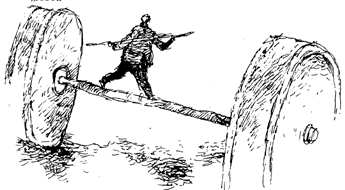 "If I had my way, you reporters would be allowed everywhere, to write what you like, to see exactly what's going on. These days, the information war is as important as ground operations." This from a senior police man who had just stopped me from meeting imprisoned "Maoist leaders" in a district outside Kathmandu. Orders, he explained, from higher-up. The officer asked that I keep his identity a secret, so I will. But he had a point. I wonder if anyone in government, the military or the media is listening.
"If I had my way, you reporters would be allowed everywhere, to write what you like, to see exactly what's going on. These days, the information war is as important as ground operations." This from a senior police man who had just stopped me from meeting imprisoned "Maoist leaders" in a district outside Kathmandu. Orders, he explained, from higher-up. The officer asked that I keep his identity a secret, so I will. But he had a point. I wonder if anyone in government, the military or the media is listening. First the question of access to information and areas of conflict. The nightly drip, drip of press releases about the actions of the security forces are not enough for the media to do its duty. For a few days after the emergency was declared, conflicting accounts and casualty figures were issued. That's to be expected. This is largely new territory for Nepal and evolving a unified voice took the authorities some time. Now it is time to find other voices, other points of view. I know they're out there, I've met a few myself in trips east and west of the capital. But in public, they're largely silent. Where are the NGOs? The human rights activists? The political parties? The independent voices of reason and caution? A state of emergency to quash a vicious insurgency shouldn't impose silence across the spectrum. Debate is not defeat. It is what gives democracy its heft, its tensile strength.
As for the military, such fine points are not the concern of soldiers. They have more pressing tasks at hand, the most crucial they've ever addressed. In a democratic system, the political process frees the military to carry out its orders. And those orders come from the people, they are expressed through the system, delivered by political leaders after much discussion. The army doesn't operate in a vacuum, not here, not in the United States.
Yet as the American campaign in Afghanistan shows, the military too needs to take the role of information dissemination very seriously. Inside Afghanistan, at the US marine base southwest of Kandahar, journalists have been alongside soldiers since the beginning. True, they are restricted in what they can say. Not by patriotism, or commitment to the mission, but to protect the safety of American soldiers. The main condition imposed upon journalists with the US forces is that they cannot divulge their location, or the movement of soldiers. That endangers lives and you agree to that before you are allowed to go.
At the same time, other journalists-myself included-tried for weeks to see the Taleban and get their side of the story. We failed. The Taleban were simply too disorganised to have an information policy. Our duty was to find out their point of view and put it across to the world. Not because the Americans and the Taleban are of equal merit, but because it is our duty. Purely and simply.
Finally, the media. There is, at the moment, a fair amount of self-censorship being practised in newsrooms around Kathmandu. In a sense, this is understandable. A violent struggle is threatening a way of life that many in the press have come to treasure. Constitutional rights, democracy, freedom of information, these are the mainstays of a free media. Bombs, massacres of police constables, bank robberies and extortion-decent people abhor such things. But opposing atrocities doesn't mean keeping mum on important matters. Reporters must report, newspapers have to dig deep into the most important news story in this country in a generation to find out just what is going on.
That means travel to affected areas. That means discomfort. That means a degree of risk and that means occasionally angering those in authority. There are stories that are not being told. In Maoist-affected areas are details of clashes and army operations that must be disclosed. Journalists could agree to various conditions, among them not reporting in any way that would endanger lives or security of ongoing operations. That doesn't mean wearing the uniform but it does mean behaving responsibly in the line of duty. Our duty.
My new friend, the police officer, agrees with all of this. But he's keeping his opinions to himself, at least as far as his superiors are concerned. I wish he would speak out on the record, but I suppose he's wise to keep his remarks private and off the record.



